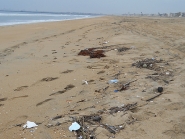The NOAA Marine Debris Program Awards Funding to 12 New Projects to Remove Marine Debris
After an intensive evaluation process, the NOAA Marine Debris Program is proud to announce the 12 recipients of our 2018 removal awards, totaling $1.5 million of funding toward marine debris removal efforts. Although prevention is essential in stopping marine debris at its source, removing marine debris is unfortunately necessary to address all the debris that is already out there. The NOAA Marine Debris Program offers an annual nationwide competitive funding opportunity to support projects that focus on community-based marine debris removal. These awards continue the Marine Debris Program’s commitment to develop impactful, community-driven and cost-effective projects that improve living marine resource habitats through the removal of marine debris.
This year's funded projects are:
Southeastern Association of Fish and Wildlife Agencies ($99,300) will remove a large swath of man-made and woody debris from the Pearl River and the nearby Bogue Chitto National Wildlife Refuge in Mississippi. The removal is key to restore hydrologic functions to the river and provide passage for fish.
Northwest Straits Marine Foundation ($221,200) will build on previous efforts to remove at least 1,000 derelict crab pots from the Salish Sea in Washington State. The project will include a robust outreach campaign targeting recreational fishers, preventing the reaccumulation of crab pots.
Center for Coastal Studies, Inc. ($128,440) will remove 16 tons of derelict fishing gear from Cape Cod Bay, and the nearby Cape Cod National Seashore in Massachusetts. The project will engage commercial and recreational fishers, students, and other coastal interest groups in the removal activities.
Stockton University ($226,299) will work with crabbers to remove derelict crab pots using low cost sonar in coastal New Jersey. This project builds off previous relationships built within the commercial crabbing industry to engage the younger, next generation fishermen by incorporating best practices into their behaviors.
Town of Beaufort ($67,889) will remove over 46,000 pounds of debris, including abandoned moorings, derelict vessels, fishing gear, and other large debris from the waters adjacent to the Rachel Carson Reserve in North Carolina. The project builds on previous efforts in the reserve to map and prioritize debris for removal.
Ocean Aid 360, Inc. ($89,295) will mobilize a diverse group of boaters, anglers, industry, and more to remove 15,000 pounds of derelict crab traps and other fishing gear from Florida’s Tampa Bay estuary. Following the removal activities, data will be collected on the species removed from the crab traps.
Hawai’i Wildlife Fund ($231,660) will remove 112 metric tons of derelict fishing gear and other medium and large scale debris from the shorelines of Hawai’i, Kaua'i, Maui, and Lana'i islands through a derelict net patrol and community-based cleanup events. The nets will be disposed of through the Nets-to-Energy program, which incinerates the nets for energy.
Makah Indian Tribe of the Makah Indian Reservation ($50,000) will build off of efforts in Washington State to remove derelict fishing gear from Washington’s outer coast, and aims to develop a sustainable tribal fisheries derelict pot reporting and recovery program within Makah Fisheries Management.
Southwest Wetlands Interpretive Association ($100,553) will implement land-based marine debris capture and removal through mechanical and hand-removal methods within the Tijuana River National Estuarine Research Reserve in California. This project builds on previous efforts and will include continued engagement with the Mexican Government, industry leads, Mexican NGOs, and a broad section of the international community.
National Audubon Society, Inc. ($127,964) will remove marine debris, including derelict fishing gear and shoreline debris, from eight islands to benefit seabird nesting habitat in Maine. The project will also conduct outreach to coastal residents and engage volunteers in shoreline cleanups.
Weeks Bay Foundation, Inc. ($50,000) will remove five abandoned and derelict vessels from the Weeks Bay National Estuarine Research Reserve in Alabama, as well as perform outreach in the surrounding community on the damage these vessels cause, and how to properly report an abandoned vessel.
Partners for Clean Streams, Inc. ($62,904) will remove 30,000 pounds of marine debris from the Maumee River and other tributaries in the greater Toledo, Ohio metropolitan area, helping to prevent debris from impacting western Lake Erie. Partners for Clean Streams will work closely with partners to detect, assess, and coordinate removal of this marine debris with volunteers through the "Clean Your Streams" program.


